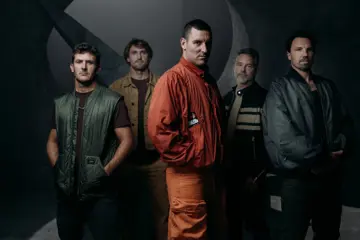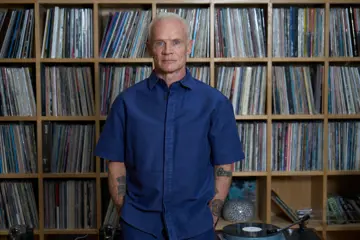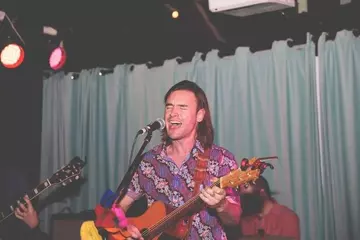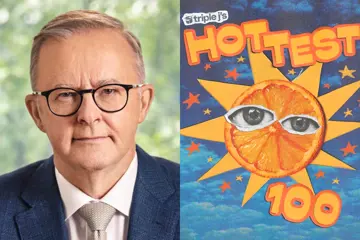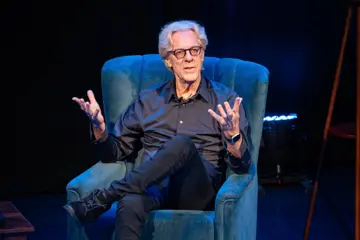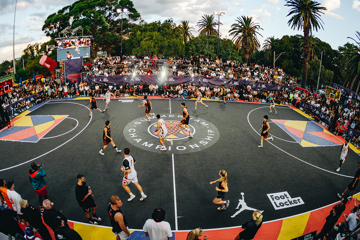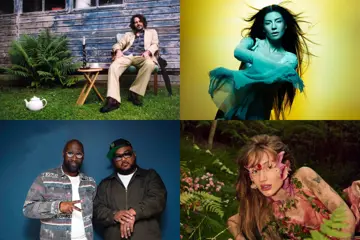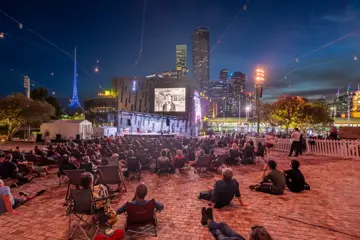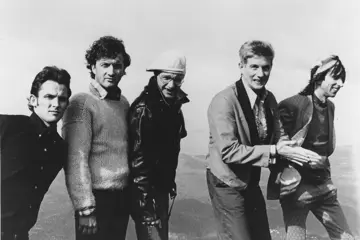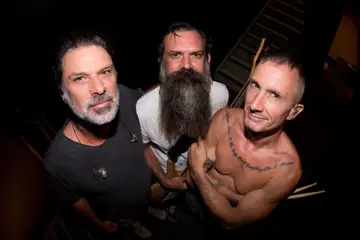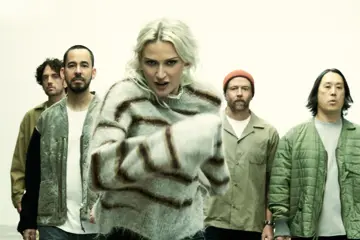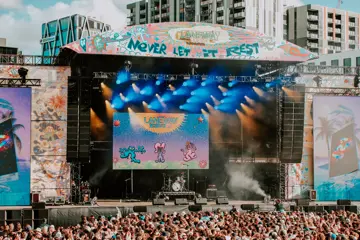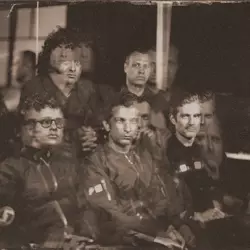 At The Drive In
At The Drive InIt's not every day that you get to speak to someone who has had such a profound impact on your own musical journey and overall life trajectory. As the frontman for two of the most forward-thinking rock bands of the last two decades – post-hardcore titans At The Drive In, progressive auteurs The Mars Volta, and numerous other outfits – Cedric Bixler-Zavala is a man revered for his live-wire vocal theatrics and erratic, mind-blending lyricism. In support of At The Drive In's latest record, ‘in•ter a•li•a,' Bixler-Zavala spoke to Killyourstereo.com from Japan prior to the band's upcoming Australian tour dates and Yours & Owls festival appearance. We talk about the reception to the band's new material, the dangers of nostalgia, artistic freedom, along with Bixler-Zavala dropping many an f-bomb. Enjoy!
Hello Cedric! How are you doing?
I’m doing good. How’s everything with you?
Everything’s great on my end, thanks. At The Drive In is currently in Osaka, doing a run of Japan shows. What’s the response been like in Japan?
Very, uh… very passionate (laughs).
That’s good to hear. I know Japanese fans have a reputation for insane responses.
Yeah, they sure do. It’s great out here.
Now, you have a small run of capital city shows here in Australia next week with Le Butcherettes, along with your appearance at the Yours & Owls festival. How excited are you and the band to return Down Under and perform for Australian audiences?
Well, since 2001, I think there’s only been one year that I haven’t been over there [to Australia], in any incarnation musically. So, technically I’ve been there every year since then. I just really love going over there. It’s great.
What is it about Australian crowds that you love so much Cedric? What’s the difference in atmosphere and dynamic here, compared to other touring destinations in the world?
Well, I think we [ATDI] really had to earn our spot in the States, and by the time we made it out to Australia, our name had already been talked about a lot. But it just seems like, that if we had started out in Australia, that the people out there would have been really rooting for us and excited for us. Just like the first time we got singed or something, you know? There’s just something over there that we connect with, and as a band, we definitely connect with Australians.
Don't miss a beat with our FREE daily newsletter
That’s interesting. When I’ve spoken about the same thing with other artists, a lot of the time Australia’s isolation from the rest of the world gets brought up as justification for that type of ‘connection’. Because we’re so far removed from the States or Europe, we’re not always a mainstream touring destination. And at least for some bands, we’re not even on their radar. So, I think when Australian audiences get to see a high-profile band like, At The Drive In, they tend to go a bit crazy for that opportunity.
See, that’s really interesting to me. Because there are so many great bands that have come from there. I think you guys have a great scene over there, and a lot of great stuff coming out of there. It’s nice to have that response.
Speaking of the new record, your fourth studio album – ‘in•ter a•li•a’ – has been out now for four months. What’s the response been like to the new material, and how well do you feel the new songs translate into the band’s live set?
It really depends on city-to-city. Like when we did a show in Cleveland – and, maybe it was because the venue was completely devoid of air-conditioning – but everyone looked and felt like they just didn’t want to be there. Of course, I always have a different point of view. Some people are just really stuck on wanting to chase the dragon of what that first high was like when you first heard the band. Some people just want to hear nothing but old stuff, and no matter what you do, you’re never going to give them that hype. And then there are some people who are just undying fans. That’s been mostly the case for us, but it really does depend on city-to-city.
It’s quite a task to keep reminding people that you don’t want to be counted out of the game. But there’re a lot of people out there who didn’t realise that we even had another band called The Mars Volta (laughs). There’re still a lot of people who didn’t realise that we had another band called Antemasque. People think that we just kind of disappeared or something (laughs). Some people get it though. My perspective is sometimes a little skewed, depending on if someone is as excited as I am. And that isn’t completely fair because not everyone is me — not everyone wants to jump off shit and break stuff, you know? (Laughs.) Some people are just watching you, thinking ‘What am I looking at?’ And I take it in the wrong way, like ‘Goddammit, I’m cheer-leading! What the fuck are you doing? Don’t just sit there!’ (Laughs.)
It’s such a weird double standard too. There’re a number of different bands who have either broken up, or gone on hiatus and then reformed for anniversary or reunion tours, and it’s interesting to get their perspective as musicians. It seems that in our internet-obsessed music culture, there’s a lot of talk from fans about whether bands are allowed to change dynamically, whether it be stylistically, or with older bands releasing new music. It’s almost a question of ownership: do the artists own their own music, or once it’s released to the world, do the fans own those cherished records or their gateway records? With At The Drive In, you guys have seminal records in your catalogue that are still revered to this day, but you’re also a creative artist, and you’ve had this wealth of creative output for years. Does it seem unfair to you Cedric, for fans of the band to only want to hear those old songs?
Well, especially when you make a band like The Mars Volta, where it was the physical manifestation of challenging ourselves and trying to pave new directions as a band. So, I think that with At The Drive In, we’ve paved a new direction with this new record that still complements the old. I can’t lose sleep over people who disagree with that. I’m never going to make everyone happy. That being said, I wouldn’t want to go up to some painter and force them to paint the same painting, over and over again.
I think that’s the problem with pop music. You create this robotic audience by giving into the cycle, by having a band come out and play some classic album in its entirety. And I’m like, ‘You gave up! Don’t give up!’ It’s great if you’re at that point as a band, it’s going to be the last time you do it, and you want to play some classic record. I don’t know… I’ve seen PJ Harvey, I’ve seen Nick Cave; I’ve seen lots of examples of artists who are like, ‘Cool. Thank you for liking the first records, but when on some new shit.’ That’s what artists do, and if you want to treat us like we’re just commerce, then maybe just go to McDonald's and wait for the McRib to come back. Because it always comes back, you know.
As an artist, you’re providing a soundtrack for every sort of seasonal moment that happens. You can’t be expected to constantly go back and recreate a high that someone got one time. Because then you’d have to go back, and reconstruct every single fucking thing that happened in millions and millions of people’s lives: their emotional state, their perception, or lack of perception as a human being at the time. It’s impossible. It’s completely fucking impossible to do that. You’ve got to let artists do what they want. If they wanna take a shit, and put that out and call it art, let them. You don’t have to like it, you know. You can move on (laughs).
Absolutely (laughs). Jumping off from that, I wanted to talk about the writing process behind the new record. In the press material, you’re quoted as saying that for the band it was about “getting back to that primordial self.” Could you expand on what you mean by that, and how that mindset shaped the concept and songs from ‘in•ter a•li•a’?
My mindset was in the wrong place. Excuse me for speaking in the third person, but I was approaching the record as ‘Cedric, the human being, now’ trying to express himself. And that was definitely the wrong approach, so it was really great that Omar [Rodríguez, guitar/vocals] would, in a pre-cognitive way, guess that that would be some of the critiques that Costey [Rich Costey, producer] would have. Which was that ‘This is not what fans would want, and if we do that, we’re going to have to accept the consequences of that.’
Instead, we decided that for once at least, in our artistic career, let’s try something where we peak the attention span of the people who loved the band originally. Then it was like, ‘How do I put myself in the mode where I don’t have all these rules and techniques I’ve accumulated?’ For me it was easy because I have kids, Tony [Hajjar, drums/percussion] has kids, Paul [Hinojos, bass] has kids, Keeley [Davis, guitar, ex-Sparta, ex-Engine Down] has kids. So, you can kind of look to your children, to see what it’s like to look through eyes that aren’t clouded, and just retrace those moments. Which sometimes is really hard, because you can’t recreate what it’s like to be hormonal in your twenties, you know? It’s one of those things where in your teenage years or your early twenties, you have this need to want something right now, but not really know what that is, so you kick and scream about it. But then as an artist, you realise that there’s this rolodex of moods and personalities that you can encompass. And it’s as easy as being like, ‘Oh, I haven’t dialled that number in a while. Let me check my rolodex.’
So, ‘primordial’ Cedric is who I was before I figured out all the things I know now, in how to express myself creatively. Omar was the one who suggested that we really get back to those moments. Costey would always tell me things, like ‘I like how you spit a million words per minute. You make me like there’s something you know about the secret, that I should know what it is, but I don’t know what the fuck you’re saying.’ (Laughs.) And then I would be like ‘Ok. I remember that part of my personality. Let’s do that.’ So, to elaborate on that quote, that’s what the ‘primordial self’ meant.
Just picking up on that last bit you mentioned, I can vividly remember getting into At The Drive In’s music, and picking up on this intense energy in the vocals and your lyrical content, in a very similar way to what you mentioned with Rich Costey’s comments just now. There’s a current, or level so to speak, that you tap into on those songs, and even though I could pick up on select pieces and kind of unpack those lyrically, I’d never quite feel like I’ve gotten the whole picture. And with every listen, there’s a new little thread, a new little piece that you can pull out. I think that’s one of the defining characteristics of great music: being able to discover something new every time you listen to it.
I can’t say whether or not I’ve accomplished that, but that’s what I get when I go back and listen to our stuff. I’m like ‘Oh, that’s what I meant.’ (Laughs.) I tend to use different meanings of the same word – like Invalid – but it’s really all over. My approach has always been borrowed heavily from people like Captain Beefheart: the court jester, fucking with language, fucking with idioms, turning stuff on its head, taking a Hallmark slogan and pissing on it, and making it my own.
That’s a very post-modern approach to music, Cedric.
Definitely (laughs).
You guys wrote a large portion of the new record during some time in Seoul, which was an experience that you compared to the band’s early years, specifically jamming and writing in Omar’s garage in the mid-90s…
Well, technically, it was prior to that. Across all these dates, all over the world, we had brought this gear with us to record ideas before and after the show. Then, by the time we got to South Korea, we had all this material to pour over and nit-pick through. So, South Korea ended up being where we had that conversation, of like we’d already gone down that road of one song, and Omar was like ‘This is not At The Drive In. This is cool, for whatever it is, but it’s not At The Drive In.’ In one way, it was like taking the steam out of my boat, the wind out of my sails, but he was absolutely fucking right. You need to put your ego at the door, and be like ‘You’re right.’ You have to knuckle down and look for that old personality in your Rolodex.
So, from there we just started duking it out, day to day over there. We were in this little studio that was the size of a hotel room. There were no creature comforts there; nowhere to watch TV; even the bathroom was strangely situated. I think the owner lived in the studio? So, we just kind of gave ourselves a bare bones situation, where we could work all the time. Plus, the studio had like regular working hours, from like 10 A.M. to 7 or 6 P.M., so we had to force ourselves every day to ‘Work! Do this. Find it.’ To find that chemical reaction, and really stick to your gut instinct. Then we did a bunch of Japanese shows, then a South Korean festival show, and then went straight back in and kept doing the record. Then we finally had a break, before jumping into some final pre-production before we got into the actual studio with Costey. A lot of stuff was born from those moments.
Echoing what you mentioned earlier, about the difficulty of tapping into the mind of a being a hormonal twenty-year-old again, what’s the vibe like in the jam room now, in 2017, twenty years on from those days in Omar’s garage in the late 90s?
I think the energy is focused on being able to say something out loud – because it’s a vocal group – without our egos saying the most. It’s like ‘It’s what you gravitate to the most because you’re going to have to sell it live.’ I hate having to say stuff like that in that situation, you know, being like ‘Ok, let’s see what that’s like, but at the end of the day, I’m going to have to sell that fucking thing.’ It’s up to me to sell it live. So, we have those conversations of like ‘Let’s change what’s most exciting, that our singer is going to be able to cheer-lead the best to.’ We get in those moments, and we listen to a lot of stuff that’s been pre-recorded – ideas, riffs, electronics sequences – and we go, ‘Ok. This cheerleader of ours likes this one the most. Let’s jump on that shit.’
Lastly, to wrap up, during the downtime you have on this upcoming Australian run, what are you looking forward to the most outside of playing shows? What’s your favourite way to kill time?
We haven’t done it in a while, but there was a Big Day Out we played and everyone was flying from city to city. But we had a friend of ours named Gregg Donovan [Wonderlick Entertainment], who was our guide at the time, who was the manager for Grinspoon. He had this idea at the time of, ‘Let’s take a minivan and go see the coast.’ We got to see, I think this is the name, The Twelve Apostles, along the coast there? We managed to treat it like a road trip. So, that’s by far my favourite thing to do, is to see Australia like that. Just wandering around small towns and stuff. I’ve always wanted to move there, but I’ve just never had the guts or the finances to make that fucking move (laughs). Either Australia or New Zealand. I love them both, they’re so inspiring.
‘in•ter a•li•a’ is available now via Rise Records/Cooking Vinyl Australia. At The Drive In Australian Tour 2017 With Special Guests Le Butcherettes, tickets are on sale Now via Select Touring. Their upcoming tour dates for At The Drive In are listed below.
Thursday 28th September – Festival Hall, Melbourne VIC
Friday 29th September – Hordern Pavilion, Sydney NSW
Saturday 30th September-Sunday 1st October – Yours & Owls Festival, Wollongong NSW
Monday 2nd October – Eatons Hill Hotel, Brisbane QLD


